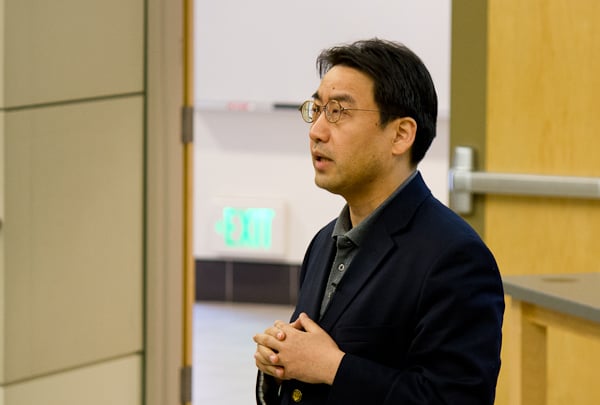
“Even if the direction is right you cannot reach the destination overnight,” said Fu Jun, professor of political economy and executive dean of the school of government at Beijing University, in a talk Monday on economic growth in China.
Fu is currently president of the Harvard Alumni Association in Beijing, as well as a frequent commentator on CCTV News and speaker at the World Economic Forum.
Fu presented his talk, titled “China in the World Economy: Past, Present and Future,” at the Hewlett Teaching Center to an audience of approximately 100 people.
The talk was sponsored by the Center for Sustainable Development and Global Competitiveness (CSDGC).
Underlying the hour and a half talk was a strong emphasis on what Fu called “institutional technology.” He stressed that this term focuses on human capital, in particular the power of corporations and educational institutions.
On the topic of education, Fu said he is optimistic about the increase in Chinese students studying abroad. He cautioned, however, that the country needs “to figure out and have confidence in more investment in institutional technology.”
“China’s growth has been a phenomenon, but I would propose that the past three decades we have learned about what I call hardware technology, and the next stage for us is to learn about institutional technologies,” Fu said.
“Growth is a function of population and technology. This is a simple formula applicable globally,” Fu added.
Despite his comments on the universality of this formula, Fu pointed out that China has a “unique Chinese way” of growing, citing examples including special economic zones and reforms in the countryside that might not necessarily be successful if instituted elsewhere in the world.
Drawing from economic history and theory throughout his talk, Fu said, “If you look at China 200 years ago, it had one-third of the total world population and was producing one-third of the total world GDP. We were normalizing.”
Although the Chinese economy has grown at a rapid pace in the last 30 years since former premier Deng Xiaoping introduced market reforms in 1979, Fu said, “We have one-fifth of the world population but we are producing roughly 10 percent of world GDP.”
“We are looking for another 10 percent to normalize,” he added.
Fu said that in the future, China needs to undertake changes including more anti-trust laws and the production of better quality products. Nonetheless, he remained positive about China’s economic future.
“We have to give credit to the [Chinese] government and the Chinese people for what they have accomplished,” Fu said. “But having said that, we should not get self conceited.”
After the talk, Fu fielded more than a dozen questions on subjects ranging from China’s GDP per capita to the balance between hierarchy and the market within the country.
“For the economy to move forward, you need to have a balance on the supply side and demand side,” Fu said in reply to a question on domestic consumption. “And right now I am concerned about the growth potential on the demand side. With the slowdown of the world economy, international markets are not demanding as much.”